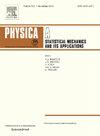Cognitive dissonance and introversion effects on opinion dynamics and echo chamber formation
IF 2.8
3区 物理与天体物理
Q2 PHYSICS, MULTIDISCIPLINARY
Physica A: Statistical Mechanics and its Applications
Pub Date : 2024-09-28
DOI:10.1016/j.physa.2024.130130
引用次数: 0
Abstract
Bounded confidence models (BCM) are extensively used to model continuous opinion dynamics in social networks. Typically, these models are analysed on static networks where edges do not vary over time. Following in the footsteps of adaptive voter models, further research has considered BCMs in the setting where agents are able to dynamically adjust their edges, which subsequently feedback into the opinion dynamics of the network. Several methods of updating connections have been proposed ranging from random rewiring to more sophisticated approaches based on concordant edges, homophily and cognitive dissonance. We present a modified form of the bounded confidence model, termed the selfish agent opinion (SAO) model, where connection updates are evaluated using a general cost function. Agents in the SAO model maintain two classes of relationships, friends and acquaintances, based on which they update their opinions and edges to optimise a payoff function that may include multiple social factors. This paper explores the effects, which we describe as “cognitive dissonance” and “introversion” that attempt to mimic postulated behaviours associated with the social concepts of the same name, on social network and opinion dynamics. We find that the SAO model naturally produces echo chambers for social networks with increased sensitivity to cognitive dissonance, whilst introversion produces high levels of fragmentation and low opinion mobility. Additionally, the effect of tolerant agents and inquisitive social encounters is investigated. It is found that both the presence of very small numbers of tolerant agents and inquisitive encounters are able to strongly promote consensus formation.
认知失调和内向对舆论动态和回声室形成的影响
有界信度模型(BCM)被广泛用于模拟社交网络中的连续舆论动态。通常,这些模型是在边缘不随时间变化的静态网络中进行分析的。继自适应投票人模型之后,进一步的研究考虑了在代理能够动态调整其边缘的情况下的 BCM,这些边缘随后会反馈到网络的舆论动态中。已经提出了几种更新连接的方法,从随机重新布线到基于一致边缘、同质性和认知失调的更复杂的方法。我们提出了有界信心模型的一种改进形式,称为自私代理意见(SAO)模型,其中的连接更新使用一般成本函数进行评估。SAO 模型中的代理保持两类关系,即朋友和熟人,在此基础上,他们更新自己的观点和边缘,以优化可能包含多种社会因素的报酬函数。本文探讨了 "认知失调 "和 "内向 "对社交网络和意见动态的影响,我们将其描述为 "认知失调 "和 "内向",试图模仿与同名社会概念相关的假定行为。我们发现,"认知失调 "模型会自然产生社会网络的 "回音室",增加对 "认知失调 "的敏感度,而 "内向 "则会产生高水平的碎片化和低舆论流动性。此外,我们还研究了宽容型代理和探究型社会遭遇的影响。研究发现,数量极少的宽容代理和探究性相遇都能有力地促进共识的形成。
本文章由计算机程序翻译,如有差异,请以英文原文为准。
求助全文
约1分钟内获得全文
求助全文
来源期刊
CiteScore
7.20
自引率
9.10%
发文量
852
审稿时长
6.6 months
期刊介绍:
Physica A: Statistical Mechanics and its Applications
Recognized by the European Physical Society
Physica A publishes research in the field of statistical mechanics and its applications.
Statistical mechanics sets out to explain the behaviour of macroscopic systems by studying the statistical properties of their microscopic constituents.
Applications of the techniques of statistical mechanics are widespread, and include: applications to physical systems such as solids, liquids and gases; applications to chemical and biological systems (colloids, interfaces, complex fluids, polymers and biopolymers, cell physics); and other interdisciplinary applications to for instance biological, economical and sociological systems.

 求助内容:
求助内容: 应助结果提醒方式:
应助结果提醒方式:


